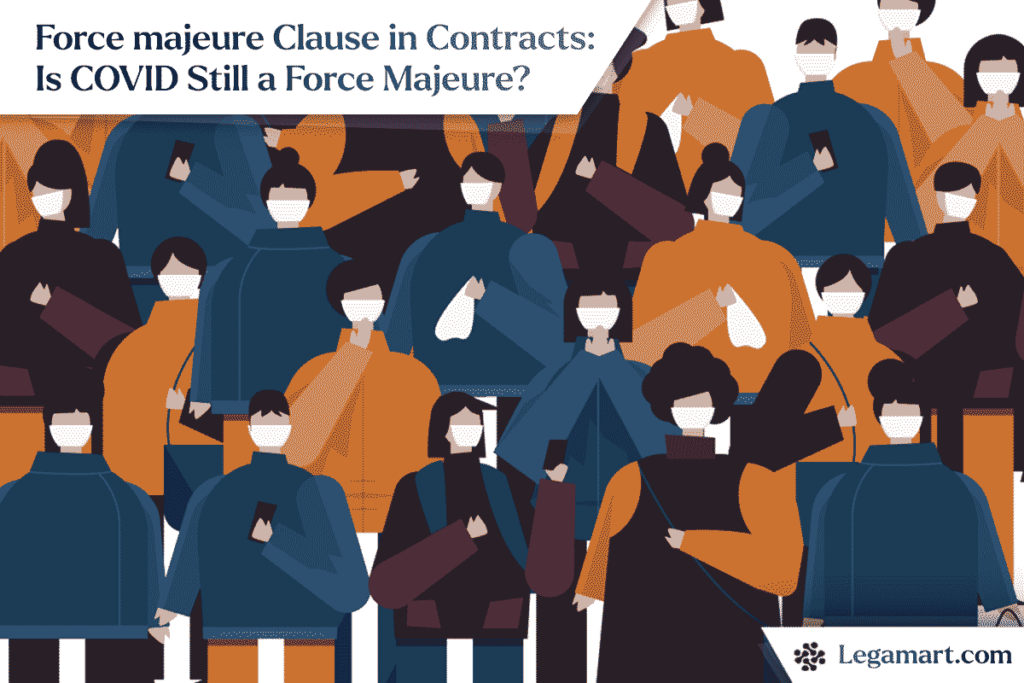Introduction
In the contemporary era, especially since the outbreak of the covid-19 pandemic, there have been numerous legal concerns and questions. The highlighted areas in this regard are the legal provisions regarding the force majeure clause in contracts, its validity, and its legal effects—all critical considerations in Legal Practice & Specialization. The question is, is covid-19 still a force majeure? – is valid and widely under debate. Here is a detailed explanation of the legal position of the force majeure clause and the question of whether or not covid-19 is still a force majeure. Force majeure Clause in Contracts: Is covid-19 still a force majeure?
In contracts, there’s a general rule which says “pacta sunt servanda,” which means agreements should be kept or otherwise, the breaching party would have to bear consequences and liabilities. In contrast, some contractual relations often have a clause, known as the force majeure clause, in a contract that protects the parties to the contract from liabilities if an extraordinary, unforeseen, and unavoidable event prevents one or more parties from fulfilling their respective obligations.
These unforeseeable and inevitable circumstances include natural disasters, like floods, earthquakes, hurricanes, and tornadoes, human actions like armed conflicts or wars, or outbursts of some diseases, for example, the recent pandemic-covid-19.
Such type of clause often appears in commercial contracts where parties to the contract establish rules governing their obligations if a force majeure event occurs. It varies from contract to contract.
What is the Force Majeure Clause in Contracts?

“Force majeure” is a french term that means “greater force.” It means “acts of God,” which are unforeseen and out of human control. The greater force also implies human actions that are serious, like wars.
By this, a force majeure clause is defined as “a clause given in a [commercial] contract agreement, incorporated into it by the mutual consent of the parties to remove liability for unforeseen and unavoidable events that prevent parties from fulfilling their obligations since the expected course of action is interrupted.”
How do Courts Determine Whether a Pandemic is Covered by Force Majeure?
An event like a pandemic poses the problem of determining whether force majeure applies and whether the event falls under the force majeure category. To resolve this, the courts seek answers to the following questions:
- Is the event or impediment beyond the parties’ control to a contract?
- Were the parties unable to foresee the possibility or impediment before concluding the final contract?
- Are the effects or consequences of the events beyond the parties’ control?
- Are there similar implications to the event for the other similar contract in place?
If the court is satisfied and agrees on the existence of force majeure, the force majeure clause in contracts is invoked. Then, the court, under the force majeure clause, releases the parties from obligations and liabilities with further terms and conditions as determined by the court and parties.
What makes Covid-19 Era a Force Majeure Event?
Covid-19 is regarded as a force majeure event owing to its sudden and unforeseen nature, its unavoidable effects, and its impact on everyone and every sector of society.
Is Covid-19 Pandemic Still Considered Force Majeure?
Pandemics don’t see borders. The outburst of the covid-19 pandemic was in December 2019, and soon after its few cases were reported, it sped like a fire in the forest in the world. Every sector and field of life, such as; the health sector, education sector, economic sector, job and unemployment sector, tourism and business sector, was disturbed.
The economy was the hardest hit sector of all. The companies, joint ventures, partnerships, and MNCs suffered the most in the economic sector. The reason is that multiple parties are involved in the said business relations, and all were vulnerable to the adverse consequences of covid-19 on the business firm. In such situations, the force majeure clause in contracts applies.

Whether a force majeure clause in such a situation is valid, how long the force majeure clause in contracts stays valid, and who determines this validity are the most important questions raised with the outburst of covid-19 and are valid even today.
It is crucial to keep in mind the circumstances and timeframe of the signed contract when deciding whether covid-19 is still a force majeure.
Legal stance regarding the validity of force majeure clause in contracts signed before covid-19

First, the question of the applicability of the force majeure clause in contracts signed before covid-19 is to be answered. It depends on the type of the contract and whether services, products, or transactions are the subject matter of the contract.
Then, it is to be ensured that the contracts were signed before covid-19, and without knowledge of it, such contracts will fall under the valid force majeure category of contracts. The benefits of the force majeure clause are valid for the parties to such contracts; that means the parties are, according to law, free from the obligations of the agreement.
Thus, it will be correct to regard covid-19 still a force majeure in such cases, and a force majeure clause in contracts signed before covid is valid.
Legal stance regarding the validity of the force majeure clause in contracts signed after covid-19
Secondly, the validity of the force majeure clause in contracts signed after the outburst of covid-19 and with knowledge of it is concerned, the answer is different. Almost three years have passed since the first case of covid-19 was reported in 2019.
At that time, the event was unforeseen and unavoidable, due to which the covid-19 pandemic is rightly regarded as force majeure. However, after almost three years, vaccines are available, and most people have also taken their doses.
The borders are reopened, and the economic sector has gradually returned to its pre-covid pace and position. Thus, according to law, the force majeure clause cannot be invoked in such contracts, and the parties to these contracts cannot benefit from the force majeure clause in such contracts.
Regarding the pandemic now, nothing seems to be unforeseen further. Many research papers and online content are available to study the further possible implications of covid-19. Moreover, some organizations are still publishing the statistics of reported cases, deaths, and other losses online and updating the same.
These publications and online reports show that there is nothing new to come such that it would utterly upset the globe as covid-19 in its first wave did. Thus, the force majeure clause in contracts cannot be invoked owing to covid-19 for the contracts signed after its outburst.

Conclusion
The outburst of covid-19 in 2019 led to various issues and concerns in the business sector. It was regarded as a force majeure and invoked the force majeure clause in contracts active during that phase. Since the ease of tensions relating to covid-19 throughout the world, the question now is; is covid-19 still a force majeure? It triggered a series of legal debates.
As a general rule and according to the type of contract, if the contract was signed before covid-19 with a force majeure clause in it, and if the court accepts that clause’s validity, the parties are not liable.
If the contracts are signed after the outburst of the covid-19 when everything about it is explored, people have been vaccinated, borders are open, business and life have returned to routine, and the force majeure clause in contracts is not valid.
LegaMart is a global legal platform designed to connect individuals, startups, and businesses with qualified lawyers across jurisdictions. With a mission to simplify cross-border legal services, LegaMart provides users with access to a diverse network of vetted legal professionals who specialize in areas such as international law, corporate law, immigration, dispute resolution, and more.
By leveraging technology and user-friendly tools, LegaMart allows clients to search for lawyers by country, language, or legal expertise, submit their legal queries, and receive tailored legal solutions in a streamlined, efficient manner. The platform serves as a bridge between legal professionals and clients who need multilingual, multi-jurisdictional support — especially in today’s increasingly globalized legal landscape.
Whether you’re an entrepreneur launching a business abroad, an individual dealing with immigration paperwork, or a company navigating cross-border compliance, LegaMart aims to make legal help more accessible, transparent, and collaborative.




